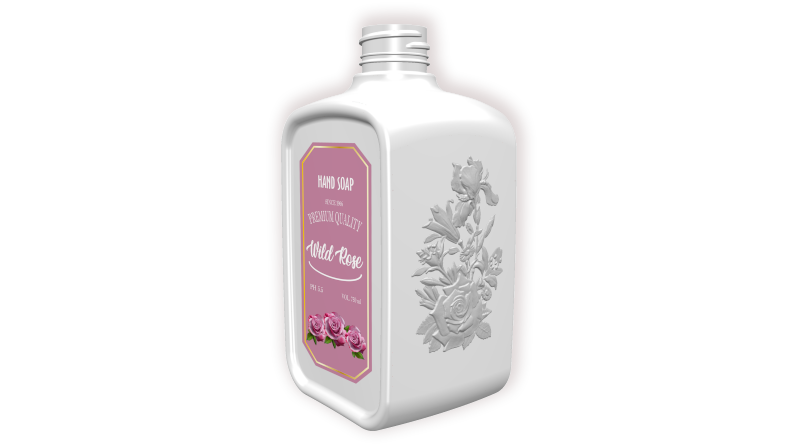PET and rPET containers design for liquid soap
In-house mould making at 12 machining centres
In the household detergents sector, plastic packaging, whether rigid or flexible, continues to dominate. In 2020, the use of detergents and disinfectants has favoured the growth in market share attributable to rigid plastic packaging over, for example, metal packaging. The world consumption of plastic materials for producing containers for household and personal care cleaners has grown an average of 4.8 % per year over the last ten years.
The primacy of plastic for household and personal care products
Plastic packaging in its totality covers 94 % of the packaging of cleaning and maintenance products. Detergents, cleaners, cleaning and chemical products are often packed in PET containers with a square or a rectangular base, that make the handling easier and represent a marketing tool that gives value to the product they contain. Safety, functionality and ergonomics are the main features that the containers used by manufacturers of detergents and sanitisers must have. These characteristics can be easily achieved by using plastic packaging material.
The advantages of plastics – especially of PET – in the production of containers for personal care and pharmaceuticals are: The material is cheaper than other packaging solutions; it is light, flexible and has a high resistance especially during the transport and storage of products; furthermore, the processing of plastics requires less energy compared to other materials, such as glass.
From the design to the production of containers
The PET bottle represent as well a perfect opportunity to highlight products such as hand soap. Thanks to a team of specialised engineers and latest generation designing tools, SMI is able to design, develop and virtually prototype a wide range of packaging solutions made from rPET and PET, which can meet customers’ specific requirements in terms of safety, functionality and ergonomics.
The containers recently designed by SMI for liquid soap packaging highlight the product contained thanks to their shape and special decoration. The idea was to add a “look” that satisfies the specific requirements of customers, such as illustrating plants and flowers used as soap aromas. The best way to appeal to buyers in the points of sales is to draw their attention to the products on the shelves through a nice container as the first step to getting it into their basket. SMI relies on an advanced 3D CAD department for bottle design and graphic processing, that, after an accurate analysis of the customer’s requests, turns the container idea into a detailed project and, finally, into a physical prototype. SMI stated that until now their engineers have designed around 1,700 containers, featuring simple and highly complex shapes suitable for different products.
Container moulds
SMI manufactures moulds and machines for stretch-blow moulding, filling and packing containers in PET and rPET. The bottle moulds installed on SMI stretch-blow moulders are manufactured using a special aluminium alloy. The 12 machining centres installed in SMIMEC can achieve an output rate of 15,000 moulds per year and are equipped with linear motors running at 80 meters per minute and mandrels running at 30,000 rounds per minute.
For large-scale production of these containers, SMI offers a wide range of rotary stretch-blow moulders from EBS Ergon series, available in stand-alone or Ecobloc version, integrated with the filling and capping modules. SMI machines from EBS Ergon range adapt to the needs of smart and green factory for productions up to 36,800 bph.

